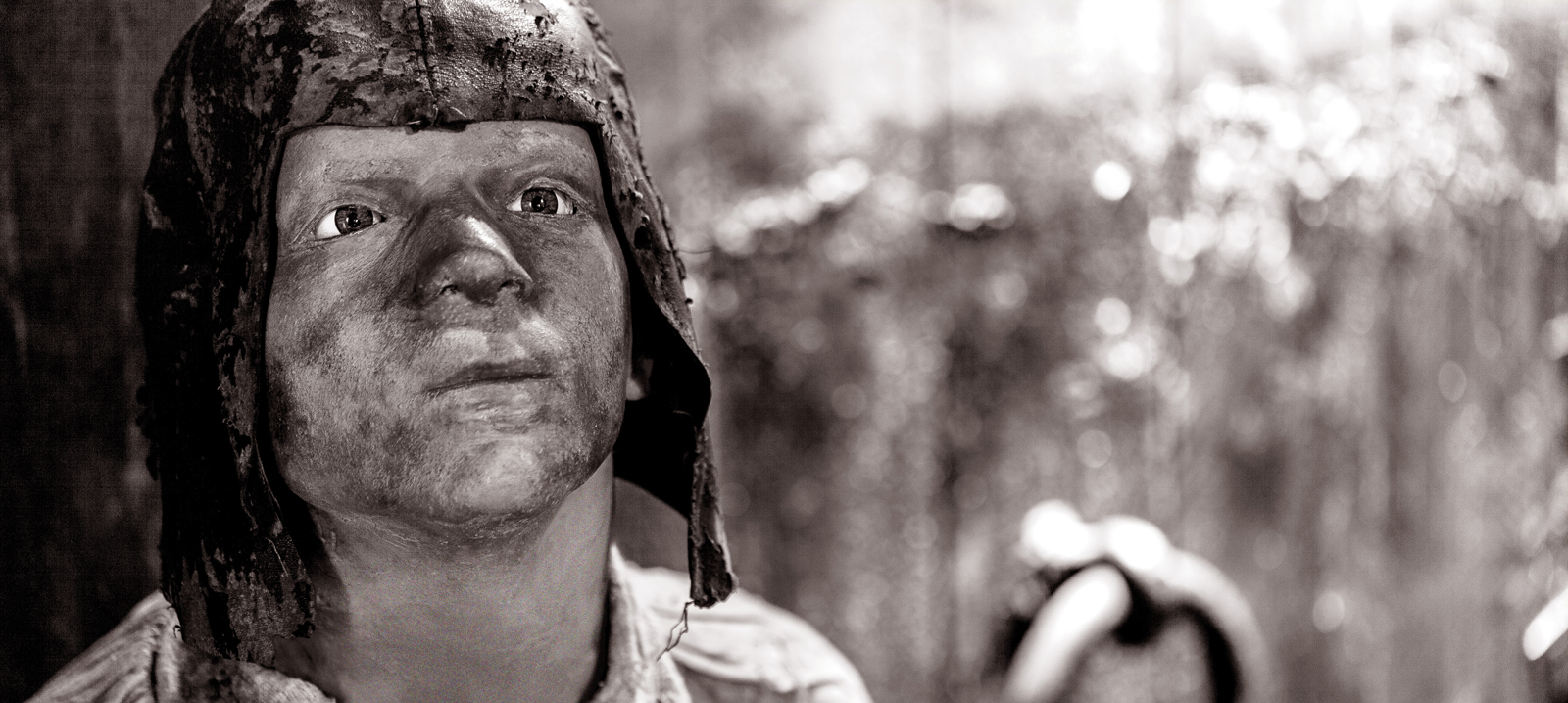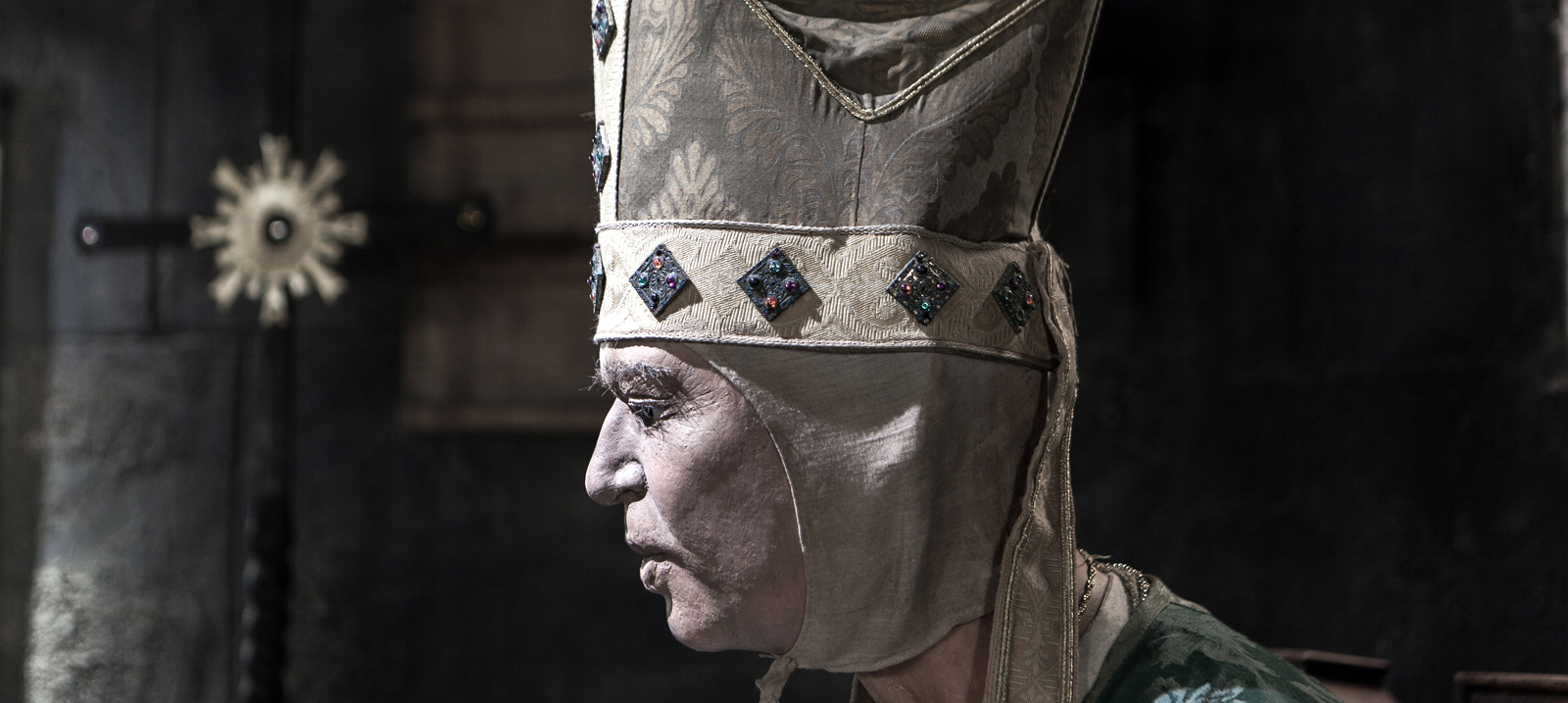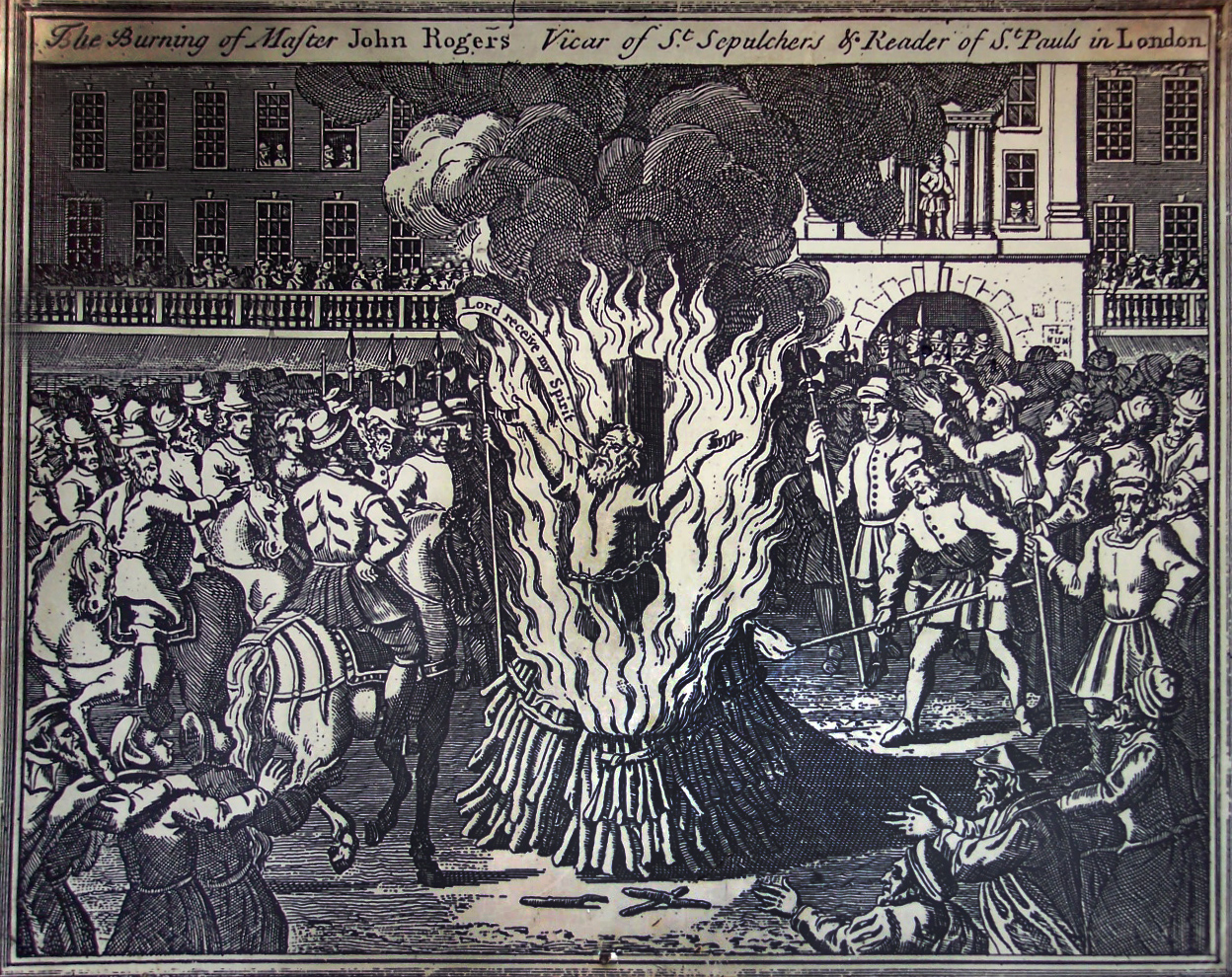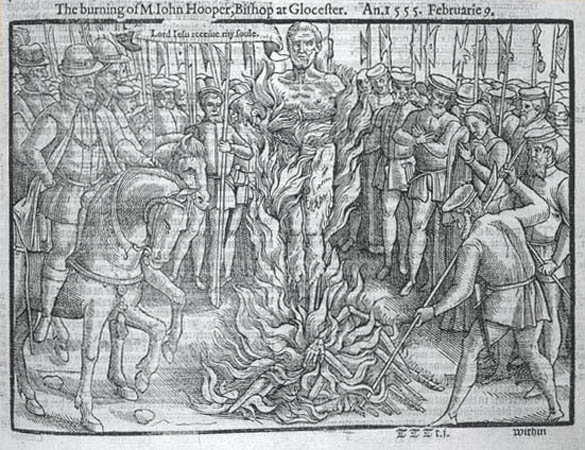THE RICH & GORY HISTORY OF THE CLINK PRISON

In 1129, Henry of Blois, brother to King Stephen (and grandson to William the Conqueror) was invested Bishop of Winchester, and became second in power only to the King himself. His Thames-fronted residence, Winchester Palace (of which The Rose Window
of the Great Hall is still visible today), was completed in 1144 and contained two prisons within the palace grounds: one for men, and one for women. Thus Bankside became subject to the laws of ‘The Liberty (or jurisdiction) of
the Bishop of Winchester’ (later the ‘Liberty of The Clink’) and was governed accordingly.
The name ‘Clink’ seems to have been attached to the prison in the 14th century. One of the most commonly-argued
derivatives is that of the sound of the blacksmith’s hammer closing the irons around the wrists or ankles of the prisoners, although the Flemish word ‘klink’ meaning ‘latch’ (perhaps referring to the latch on the gaol door) could
also have influenced its attachment. Whatever the etymology, the prison subsequently bequeathed this name to all others, resulting in the development of the expression, "to be thrown in The Clink."
During its remarkably long span, besides the usual drunken vagrants, vagabonds and other seemingly petty criminals, The Clink also housed more historically significant criminals. Famous examples include Sir Thomas Wyatt The Younger (son of the Renaissance
poet of the same name), who rebelled against Queen ‘Bloody’ Mary I; John Rogers, the man responsible for translating the Bible into English from Latin during the reign of the aforementioned Roman Catholic Queen; Royalist supporters
during the English Civil War, and Puritans who went on to become the first Pilgrim Fathers, settlers of the New World in what is now Plymouth, Massachusetts in the United States.
Throughout this
long existence, The Clink did not remain unscathed however; several attempts to destroy the prison were enacted through rebellion, such as during the Peasant’s Revolt in 1381, or during Jack Cade’s rebellion of 1450, both of which
resulted in the rebuilding of The Clink, with the latter resulting in a new, two-storey men’s prison on the site of what is now The Clink Prison Museum.

It endured until 1780, when Lord George Gordon, dissatisfied with the favours granted upon Catholics during the ‘Papists Act’ as a result of the American War of Independence, assembled The Protestant Association and broke into The Clink, releasing all of the prisoners and burning the building to the ground. The Clink was never rebuilt, and as somewhat of a happy postscript, none of the prisoners seem to have ever been recaptured. Today, all that remains of Bankside’s once most notorious prison is the stonework of Winchester Palace, the passage ‘Clink Street’ and that which has been preserved within The Clink Prison Museum, including an original wall.
NOTEABLE EVENTS at
The Clink PRISON MUSEUM
1300s
1386 -1486
No trespassing
Inmates imprisoned due to an act of trespass conducted in a dilatory manner. Paul Crosse, Pears Shattle,Harry Joanysserson, Wendall Gretlose, John Hewhet due to discharge from obligation without quittance being given (presumably running away from the master he was apprenticed to) John Wright found guilty of trespassing.
1400s
the escort & the Escorted
John Norys convicted clerk, escorted from here to Farnham by two paid men on hired horses, with an extra horse for himself.
Ellen Butler imprisoned as an unlicensed prostitute
1409-10
pay for your life
John Samoun, before being hung as a villain the bishop received £21 5s. 3d from John’s possessions and goods.
John Boys and Thomas Terying paid £5 5s. for the terms of their lives.
John Bocher and John Estyler imprisoned.
1437-57
the oldest profession
Margaret Hathewyk appears to have been a stew house keeper
1460
boys again
John Boys and John Hakett transferred to Winchester Prison escorted by three horsemen.
1486 – 1529
unknown issues
Thomas Peryell imprisoned in Clink from for refusal of bail,
contempt of writ, and other unknown issues.
1500s
1500-10
a long list of sins
Laurence Vaux – Catholic, died in prison due to starvation and ill treatment – author of a catechism
Dr Taylour removed from The Clink and moved to the Counter by St Mildred’s Church in the Poultry Counter.
Venerable Richard Leigh – arrested for keeping a book called ‘My Lord Leicester’s Commonwealth’ and also aiding the escape of the Venerable William Dean from Bridewell. Leigh was moved
to the Tower in 1588.
Father Southwell
Henry Pratt – Secular Priest.
Priest Saxy – hung himself in his cell rather than face torture.
1515
hunger games
Alice Skeyling, widow – taken to court for meat and drink paid for by Lord Audley.
1538-44
don't mess with the blacksmith
Henry Babington of Co – found guilty of trespassing.
Thomas Hopkins – Assault on Walter Upton and refusal to pay for the dying of 4 yards of cloth.
John Stones – debt of £15 owed to blacksmith.
1550
a different tale
John Rogers – published the Matthew Bible.

1555
late release
Bishop Hooper published the Matthew Bible.

1556-58
the usual suspects
Thomas Tyler
Myles Nylson
John Draper
1568
12 year plea
Jane Gouldwar pleading for release in 1580 having been in prison, bringing up a family, for 12 years.
1574
the other one
Latymer – ‘an old priest’
(not to be confused with Bishop Latymer, burned to death 1555)
1577
sick leave
Robert Clibon – released for six month period to go to Bath and recover from illness.
1580
prison rat
Anthony Tyrrell apparently a Jesuit tasked by the Pope to assassinate Elizabeth I, served as a spy in The Clink vainly trying to implicate William Weston in Babington Plot, though he did implicate John Lowe and John Adams, both of whom were executed at Tyburn in 1586
1584
live & die in the clink
Anne Launder - imprisoned 22nd March 1586; Anne died in The Clink 1589, John in 1591.
Jasper Heywood, a Jesuit locked up here, later moved to The Tower. Nephew of Sir Thomas More.
John Launder – John imprisoned 18th June 1584, John died in The Clink in 1591
Venerable William Way (aka Flowers and May) – imprisoned for his religion, taken to Newgate for questioning, 1588.
1586
hanged, drawn and quartered
John Lowe and John Adams – Friends of Father Weston, believed to be influential among the heretics of The Clink; hanged, drawn and quartered at Tyburn in 1586 over
their complicity in the Babington Plot.
Father William Weston – Jesuit arrested 3rd August in connection with Babington Plot, put in The Clink on 11th September and questioned several times.
Richard Claybourne – a gentleman imprisoned for refusing to attend service (Protestant service presumably).
1590s
1592
the puritan church
Henry Barrowe and John Greenwood – released from The Clink 1592, founded the Independent Church (Puritan), returned to The Clink in 1593 and then hung at Tyburn. (The Independent Church
congregation eventually sailed to America on the Mayflower).
John Greenwood was previously imprisoned in The Clink in 1586 ‘for reading scripture’ (presumably in a very Puritan manner!);
after six weeks Barrowe visited him, and the keeper refused to let him
out again!
1593
short sentence
George Butcher
1596
ball & chains
Francis Johnson, Puritan, during his time in The Clink he secretly married a widow, Thomasina Boyes. Johnson was released in 1596, and may have become involved with the Barrowists.
1597
the one that got away
John Gerard – Jesuit, moved here from the Poultry Compter in after his friends had bribed Young to move him (whoever Young was). Said Mass in the Clink and took confessions – even to the point of converting other prisoners and some of the guards! Seems to have been a highly impressive character – even after he was tortured in The Tower, he went on to escape!
1598
end of the line
John Jones – Franciscan, executed
1599
friend of a friend
William Houghton – actor and playwright imprisoned for debt (a friend of a friend of Shakespeare’s brother in law – this would appear to be the much vaunted Shakespeare connection –
Houghton worked for the Henslowe/Alleyn company, rather than that run by Burbage/Shakespeare)
William Albaster – refusal to attend church.
St John Rigby – non-attendance at church over 2-3 years, hanged 1600
1600s
1601
wrongfully accused
Thomas Preston – heretic, last surviving monk of Westminster.
Robert Davison – wrongfully arrested for murder of Edward Woodye
William Warmington
John Duke – famous actor locked up for a debt of £8.
1602
spies & conspirators
Adam Dowse – arrested as ‘an impudent spy’.
Francis Barnaby – Catholic priest
William Clark – Bye Plot conspirator, executed December 1603.
1605
a changed man
Henry Jacob – Congregationalist, begged for release and promised good behaviour.
1608
paid in full
Henry Lok – poet and debtor.
1609
say no more
Mr Collington – Heretic.
1613
business as usual
John Colleton – secular priest.
George Blackwell – died in Clink.
1618
a fair exchange
Richard Davies and William Davies – Catholics, sent to Wisbech Prison to be with other Catholics
1621
bad religion
Father Edmond Cannon – Jesuit.
1624-40
money is not an issue
Father Thomas Preston, lived richly in The Clink.
1629
close friends
John Dayley and Thomas Leake – moved to Clink from Newgate to be held in close confinement.
Matthew Wilson, aka Edward Knott, Jesuit.
1630
catholics & heretics
St John Southworth – Catholic priest, imprisoned here with 15 others
Jasper Loberick – Heretic.
1632
the only way is out
John Lothropp’s fellow Puritans were released in 1634, but Lothrpp was considered too dangerous, and retained. He eventually sailed to the New World on The Griffin in 1634.
1640
the only way out
Thomas Preston - Benedictine.
Spent many years in prison and died in the Clink Prison, 5 April.
1643
rebel souls
Sir Kenelm Digby – prisoner of Civil War.
John Ogle, quite possibly prisoner of the Civil War, as there was a Lord Ogle fighting for the king in the West Country, notably holding Winchester in 1645.
1645
rebel souls
William Wilkinson – released from Winchester House on bail. He was another possible prisoner of the Civil War
1650
one in a million
Robert Cox – died in The Clink.
1661
a falling star
Prusanna Carnall – prostitute, (that must be a professional name).
1680
the arsonist
Margaret Clark – conspiracy to arson.
1700s
1705
had to pay
Thomas Bamlett – probably debtor.
1712
a free man
Henry Broncker – probably released






